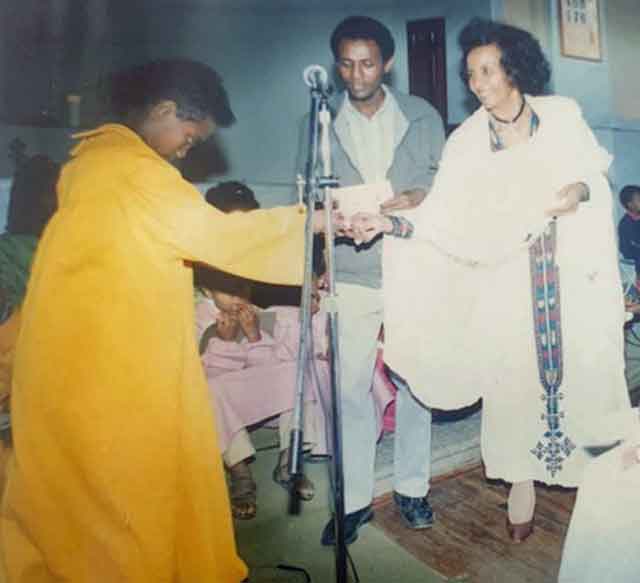Abeba Kiflegzy Yedigo [አበባ ክፍለ እግዚእ ይሕደጎ] was born in Addis Ababa in 1929. She was the sixth of ten children of Kiflegzy Yedigo and Amete-Tsion Kaleb, who moved from Eritrea to Addis Ababa a few years before Abeba was born. Blatta, later Dajjazmach Kiflegzy served as a prominent judge in Addis Ababa and later was appointed to the Higher House in Parliament. The family was an early member of the Lutheran Church of Ethiopia and later of the Ethiopian Evangelical Church Mekane Yesus (EECMY).
Upon reaching school age, Abeba was enrolled at the American Mission School for girls in the Gullale area of Addis Ababa. Later, she entered Empress Menen School for Girls and the private Sandford English School until she reached Grade 12. Abeba taught at the American Mission School for a year before she married Emmanuel Gebre Sellasie, an upcoming leader of the Evangelical congregation in Addis Ababa, who later became the first President of the EECMY.
Abeba was an active member of the Mekane Yesus Church and increasingly played a leading role among the women, serving as President of the Women’s Service from 1955-57, 1960-62, 1967-69, and 1975-77. Her support role continued at various levels and committees throughout the following two decades (e.g., serving on the Spiritual Growth Committee and the Family Committee).
Abeba used to sing in the choir of the first Mekane Yesus congregation (at Amist Kilo in central Addis Ababa). She was self-taught on the guitar and accordion, using ‘how to learn’ music beginner through advanced literature. Throughout her life, Abeba enjoyed various types of music, such as light classical music and songs by African singers like Miriam Makeba.
In later life, Abeba tailored her contribution to the musical development of her congregation. As Head of the Music Committee, she organized the choir groups and determined what they would sing for specific seasons, holidays and occasions. Abeba counseled junior choir leaders and directed the senior choir at her church for years, conducting young and old alike. She was a familiar figure on many Sundays: she played the organ, directed the choir, and made sure that everyone practiced enough the day before performing for the congregation.
Another talent that delighted people around her was the art of poetry. Abeba began writing poems whenever she found the peace of mind to collect her thoughts and channel them into verse. Besides, she had a thirst for learning. Married and at the age of 30, she enrolled in a three-year French course at the University College. She Abeba had a thirst for learning. In 1994, Abeba, now a grandmother, received a Theology Certificate after completing a course of study at the Mekane Yesus Seminary in Addis Ababa.
Abeba’s sterling contribution was her editing and translating of 501 hymns, and author others included in the 1997 edition of the church hymn book, Səbhat läʼamlak. A motivated musician, Abeba spent countless days over a period of years painstakingly reviewing and revising the hymnbook with the support of members inspired by her determination to complete the formidable task. Her name appears below the words of more than 60 hymns in the book, which also includes the name of her older sister Yemissrach, and in at least one case, her father’s name.
Abeba Kiflegzy lived a full life — for her family, church and community. She passed away after a short illness in 2011.
Songs in Hymnbook
Səbhat laʼamlak (2007 A.D.)
- There are 17 hymns written by Abeba Kiflegzy:
no. 12, 53, 111, 112, 136, 165, 167, 190, 209, 283, 289, 474, 490, 497, 508, 509, 517.
- In addition, there are about 50 hymns that were translated by her:
no. 13, 23, 32, 36, 74, 77, 92, 117, 118, 119, 123 [co-trans. Hagos], 137, 202, 215, 216, 223, 224, 227, 228, 229, 230, 232, 234, 249, 251, 257, 277, 288, 304, 309, 317, 339, 341, 343, 346, 360, 364, 375, 383, 385, 391, 411, 416, 436, 441, 460, 479, 481, 496, 518.
- Hymns written by Yemissrach Kiflegzy: no. 348, 473
Hymns translated by Yemissrach Kiflegzy: no. 186, 281
- Hymns translated by Kiflegzy Yedigo: no. 128, 220 [first in SL 1973]
- Hymn translated by Emmanuel Gebre Selassie: no. 340
Audio
Publ. in 2023:
Picture

Further reading
Ahrens, Christel and Ebise Ashana, eds. (2020). In Memory of Them: Women witnessing to Christ in Ethiopia (1870-2019) (Contributions to Mission Studies/Intercultural Theology 48). Zürich: Lit Verlag. [p. 120-122 on Abeba Kiflegzy]
— Hiruy Amanuel
(with additions by Tsega Emmanuel)